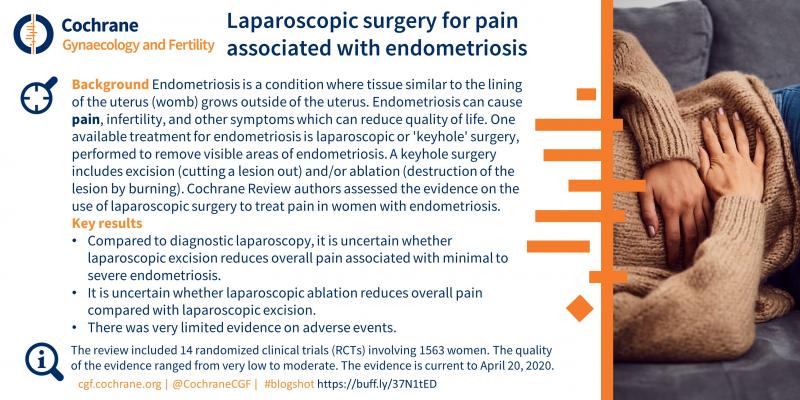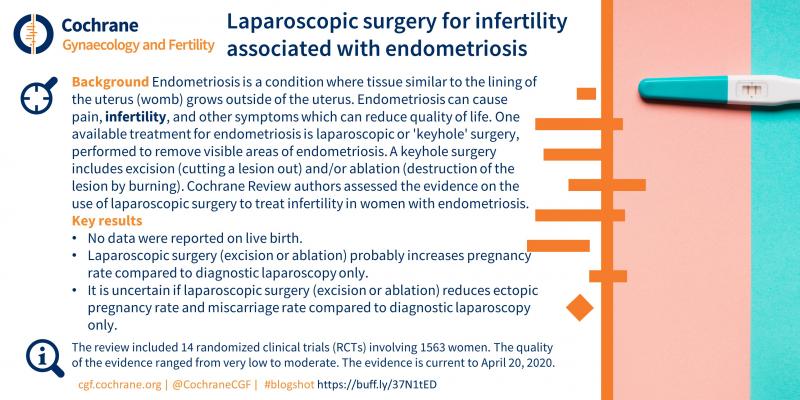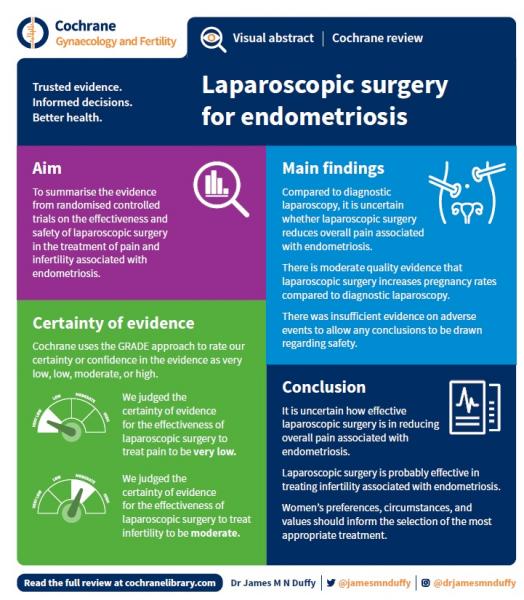
Laparoscopic surgery for endometriosis: a Cochrane update
Endometriosis is a condition where tissue that normally lines the uterus (womb) grows in sites other than the uterine cavity. Endometriosis can cause pain, infertility, and other symptoms which can reduce quality of life. The management of endometriosis remains challenging. There are 2 main therapeutic options: medical treatment and surgery. This review focusses on laparoscopic surgery for endometriosis.
Laparoscopic or keyhole surgery aims to treat the structural causes of pain, infertility and other symptoms associated with endometriosis by destroying or removing all visible endometriotic lesions and restoring the normal anatomy. A keyhole surgery includes excision (cutting a lesion out) and/or ablation (destruction of the lesion by burning).
Authors of this updated Cochrane review evaluated the effectiveness and safety of laparoscopic surgery in the treatment of pain and infertility associated with endometriosis. The core outcome set for endometriosis was implemented in this review. The review included 14 randomized clinical trials (RCTs) involving 1563 women. The evidence is current to April 20, 2020.
The priority review “Laparoscopic surgery for endometriosis” has won a grant from Cochrane Review Support Programme.
Key findings: Pain Outcomes
- Compared to diagnostic laparoscopy, it is uncertain whether laparoscopic treatment reduces overall pain associated with minimal to severe endometriosis.
- It is uncertain whether laparoscopic ablation (destruction of the lesion by burning) reduces overall pain compared with laparoscopic excision (cutting a lesion out).
- There was insufficient evidence on adverse events to allow any conclusions to be drawn regarding safety.

Key findings: Fertility outcomes
- There were no data on live birth; however, there is moderate quality evidence that laparoscopic surgery improves viable intrauterine pregnancy rate compared to diagnostic laparoscopy only.
- It is uncertain if laparoscopic surgery (excision or ablation) reduces ectopic pregnancy rate and miscarriage rate compared to diagnostic laparoscopy only.

Dr Celine Bafort, resident in training and research fellow at the Leuven University Fertility Centre (Belgium) summarises the findings of the review:
“A joint physician-patient decision for surgery should be made with knowledge of the current evidence considering the women’s preferences and values. If child wish is present, laparoscopic surgery could be offered to women with mild to moderate endometriosis. There is uncertainty regarding the most appropriate laparoscopic method to be used for the treatment of the endometriotic deposits. For the management of severe endometriosis, further research with better reporting of outcomes is required to evaluate the role of laparoscopic surgery both for pain and infertility.”

The summarized content of this review was presented at the ESHRE virtual 36th Annual Meeting in July 2020 and ASRM virtual Scientific Congress in October 2020.

Dr James Duffy, Clinical Fellow, King’s Fertility, adds
“It is important health care professionals and women with endometriosis have access to a Cochrane review which evaluates and summarises the evidence base for laparoscopic surgery. When reviewing current research evidence there is considerable uncertainty concerning the effectiveness of laparoscopic surgery for the treatment of painful symptoms associated with endometriosis. Laparoscopic surgery should only be offered when there is diagnostic uncertainty or after medical treatment has failed.”
Read the review Laparoscopic surgery for endometriosis on the Cochrane Library.
Listen to the podcast Laparoscopic surgery for pain and infertility associated with endometriosis recorded for the special #MyEndometriosisQuestion series in March.

